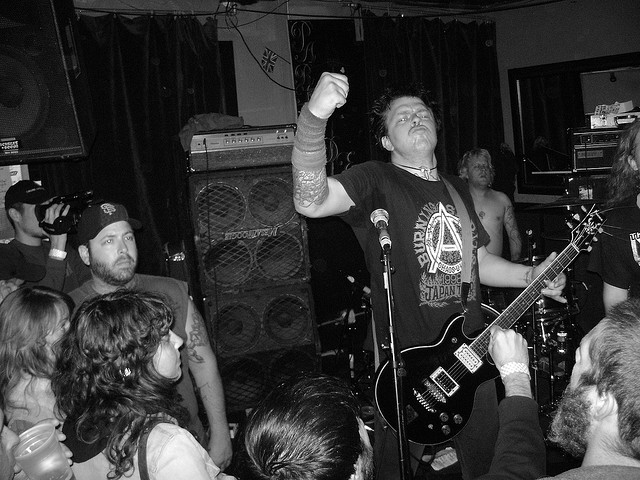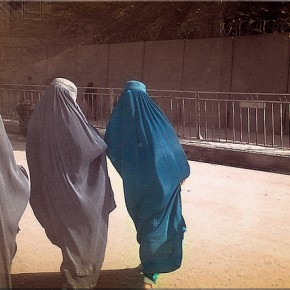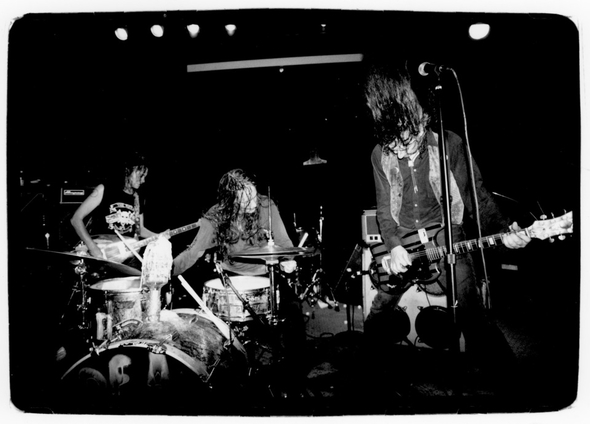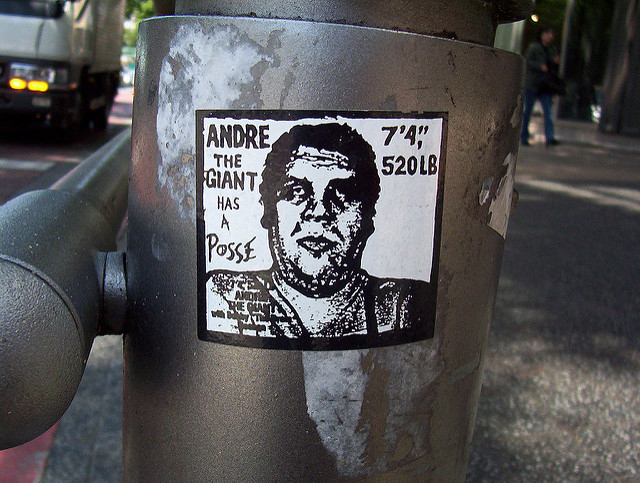Tragedy’s new Darker Days Ahead LP is the band’s first album in six years, and their fourth overall full-length. On the new record, the tempo has slowed considerably, and the atmosphere is incomparably thick and heavy. Almost as remarkable as the album’s music, however, is Tragedy’s growing legacy as pioneers of a new style of hardcore punk.
Tragedy’s roots are in Memphis crust band His Hero is Gone, a drk outfit that played a crushingly heavy style of downtuned hardcore best exemplified by 1997’s Monuments to Thieves LP. Brothers Paul and Todd Burdette formed the core of His Hero is Gone along with guitarist Yannick Lorraine; these three would go on to form Tragedy after adding bassist Billy Davis of From Ashes Rise, another noir Tennessee hardcore band. Tragedy’s sound was almost immediately more robust than His Hero is Gone; the musicianship improved and the band grew more studio savvy after their relocation to Portland, Oregon. To this day the band are able to coax an impossibly fat and crushing sound from their recordings – always without sounding slick or overproduced.
The real stars of Darker Days Ahead may be producer Billy Anderson (Sleep, The Melvins) and the drumming of Paul Burdette, which is outstanding on this release. The songwriting is equally exceptional. Producer Anderson has worked with the Swans and Neurosis, two bands whose songs have a spacious, booming quality that one can feel all throughout the dramatic musical landscape that is Darker Days Ahead. Although Tragedy are the epitome of DIY hardcore, and have cited the influence of low-fi d-beat bands like Disclose, Tragedy do not sound “raw.” At all. The bottom end of Tragedy’s sound is well-defined, rich and layered; this is apparent on all their LPs, but especially on the new one. Darker Days Ahead is the kind of album that will put your subwoofer through its paces. And you do need a good subwoofer to listen to it properly.
The real tradition to which Darker Days Ahead belongs is that of the dark, apocalyptic crust of British bands like Amebix, Axegrinder, and Zygote. These bands were never as enamored of straight-ahead thrash as their peers in the ‘80s and early ‘90s; they preferred instead to produce slogging, gloomy songs that relied more on the creation of a certain kind of bleak atmosphere than on the power of speed. Having said that, Tragedy can and do play fast; this is in ample evidence on songs from their older LPs, like Rabid Panic off 2006’s Nerve Damage LP.
On the new LP, however, they mostly choose more slower, more complex, drumming arrangements. The song Grim Infinite, for example, proceeds along at a steady, trudging gait, very reminiscent of Amebix’s Axeman. Hoarse vocals bellow over deliberately paced, palm-muted guitar chug: “Like prisoners in the perfect jail / the workers needn’t be watched / because they watch themselves / Not only those who give the orders / but those who command what orders to give.” The song temporarily speeds up for the chorus: “We are guards and guarded at once.”
Have Tragedy been reading Foucault’s Discipline and Punish? The lyrics in “The Grim Infinite” strongly parallel the Panopticon, Jeremy Bentham’s model prison where inmates would internalize power relations to such a degree that they would police themselves, and up doing the masters’ work for them. Foucault wrote that a prisoner in such a jail “assumes responsibility for the constraints of power; he makes them play spontaneously upon himself; he inscribes in himself the power relation in which he simultaneously plays both roles; he becomes the principle of his own subjection.” A controlling society would creepily work the same way, Foucault always warned. Tragedy’s lyrics sound a lot like this.
The title track on Darker Days Ahead sounds like it’s based on an amalgam of the riffs used by Killing Joke in their songs The Wait and Wardance. Add in a dash of the sort of epic metal Killing Joke delivered in their 2006 song Universe B, and you have one of the best songs of Tragedy’s career. Again, atmosphere is key. There are instrumental lead-ins to a lot of the tracks on Darker Days Ahead that act as ornamental preludes, always serving as the calm before the storm.
Boston’s Morne, who play a style of heavily embellished epic crust that is very reminiscent of Tragedy, may be an influencing factor in the kind of drawn-out instrumental atmospherics Tragedy employ on the new album, even if Morne themselves began under the shadow of Tragedy’s sonic influence. (Morne’s Untold Wait from 2009, by the way, is an excellent example of this style of music played at its best.) Whatever the case, the songs on Darker Days Ahead evince a concern with the alternating dynamics of sullen mournfulness contrasted against caustic fury.
A word about Tragedy’s influence among underground punk bands: Some folks have only half-jokingly referred to the subgenre of “Tragi-core” (or, alternately, “birdcore,” referencing the predilection of bands in this style to use pictures of ravens, crows, and blackened doves in their LP art.) A new legion of hardcore bands like Cwill, Ambulance, Ekkaia, Summon the Crows, The Dagda, Fall of Efrafa, The Spectacle , and others began playing a style of hardcore reminiscent of Tragedy throughout the last decade. This trend continues into the present. Even if some of these bands formed at the same time or even before Tragedy, once Tragedy made an impact (especially by way of their second LP, Venegance, in 2002) it was hard not to notice a sudden change in the sound of a lot hardcore acts. Even older bands like Wolfbrigade and Skitsystem seemed to evolve to incorporate the influence of Portland’s doomy crust masters.
And this is not to mention a whole milieu of bands like Severed Head of State, Warcry, Criminal Damage, World Burns to Death, and the aforementioned From Ashes Rise that are tightly linked into the Tragedy family tree by virtue of shared band members or other significant personnel overlaps. The recent Greek hardcore band Sarabante are one among many newer bands that shows to what degree, internationally, Tragedy’s sonic influence has spread. (Another important progenitor of “the Tragedy style” was Japan’s Muga, an amazingly well-produced crustcore band whose self-titled LP and Road of Asura releases are mandatory listening for this style of music.) “There are a lot of bands trying to sound like Tragedy all over the U.S. and the world,” Colin Grigson of The Observers and the Clorox Girls told a Portland’s Willamette Week in a rare profile of the band.
Darker Days Ahead closes with the rousing track To Earth Like Dust. Here, Tragedy quote Percy Bysshe Shelley’s “The Masque of Anarchy”: “Rise like lions after slumber / In unvanquishable number.” Tragedy are very much modern resistance music, as the band themselves admit: “I understand the feeling of feeling desperate and exasperated and feeling like you ‘re essentially losing and nothing you can do can possibly win, but you can’t give up the spirit of the fight,” Paul Burdette told a Greek blog in a 2010 interview.
The sense of tragic desperation that pervades Tragedy’s music is reminiscent of Antonio Gramsci’s often quoted phrase, “pessimism of the intellect and optimism of the will.” “We get called negative [a lot] but I think there’s a difference,” Paul Burdette explained. “I always say people often mis-characterize optimism as pessimism [in our lyrics]. If you go to sleep and you wake up and you’re in a room with shit up to your neck, to say ‘I have shit up to my neck’ isn’t pessimistic, it’s realistic.”
As of this writing, Darker Days Ahead is only available from the band on their current tour, although this will probably change soon. Like their other records, it’s self-released under the Tragedy Records aegis. The band has no official website or Facebook page.
Photograph courtesy of GoatLegSF. Published under a Creative Commons license.





